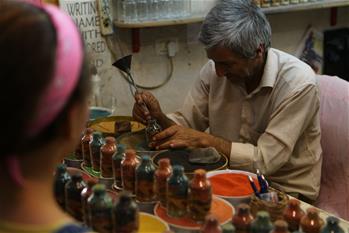ARUSHA, July 22 (Xinhua) -- The East African Community (EAC) on Monday urged partner states to increase risk and crisis communication measures to keep out Ebola fever.
Michael Katende, the acting Head of Health at the EAC Secretariat, called on partner states to strongly engage the communities in the border regions and traders and trade associations in risk and crisis communication measures.
"This is particularly important, as most of the border line is porous and difficult to control," Katende said.
"Informal and formal traders need to know the risk and be able to take informed decisions to minimize it and to actively take precautions," he said.
EAC partner states have put in place precautionary measures to stop the spread of Ebola virus disease (EVD), into the EAC region, he said.
"This includes vaccinating frontline health workers, screening all travellers at points of entry including airports and training the first responders in case of an outbreak. However, these measures might not be sufficient," he said.
The official expressed concern about EVD spreading into South Sudan with its still rather weak health system, calling upon the partner states to increase risk and crisis communication by involving community, religious and other leaders and the media in public awareness rising.
At the same time, the EAC Secretariat calls upon traders and trade associations and those travelling across the border with DRC to take extra precaution, as the EVD threat is real.
"All people crossing the border should cooperate with immigration, health and security officials who are conducting screening at the points of entry and should strictly follow their advice. Frontline health workers and members of the affected communities should accept to be vaccinated against EVD for their own protection and to help prevent the further spread of EVD," he said.
The EAC secretariat official also urged people in the affected regions to avoid unnecessary body to body contact as this is the main way of disease transmission.
"The public should be vigilant and immediately inform the nearest health workers when spot a person with signs of EVD which are: fever, severe headache, body weakness, fatigue, diarrhea, vomiting, and unexplained hemorrhage (bleeding or bruising) from various body outlets like the nose, ears and mouth," he said.
"This is particularly important along the 'green border' where no screening measures are in place," he added.













